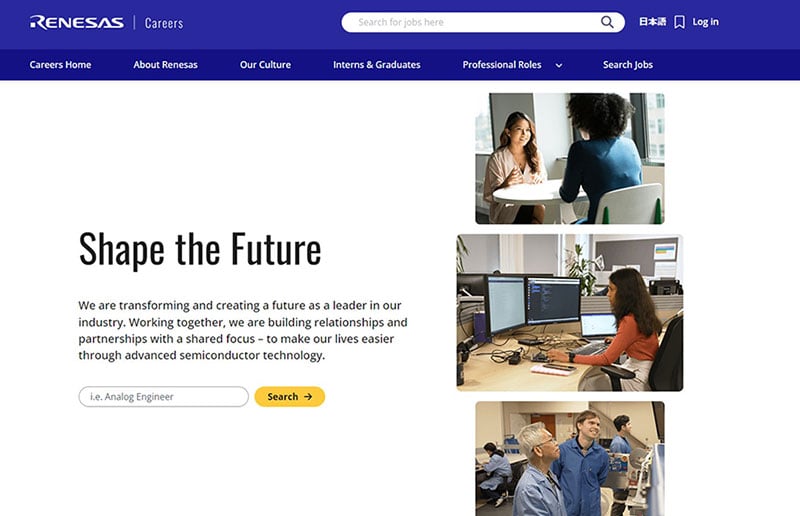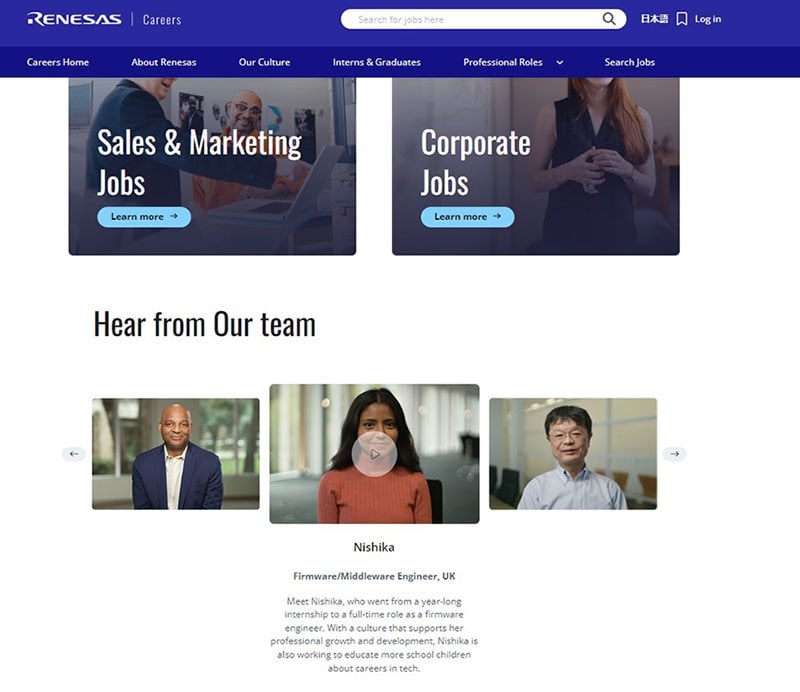As Renesas Grows Globally, Human Resources Evolves into a Strategic Differentiator
Renesas has grown from a large Japanese company serving a global customer base to a truly global enterprise with a footprint on multiple continents. That rapid expansion, much of which resulted from a series of strategic acquisitions, has introduced change to every facet of the business – including how best to integrate employees from many different countries and corporate cultures. We spoke with Chief Human Resources Officer, Julie Pope, who herself joined Renesas through the acquisition of Dialog Semiconductor. Julie introduces a new company career portal and describes how Renesas is addressing the engineering skills shortage, supporting flexible work options, and driving Diversity, Equity and Inclusion initiatives.

Renesas: What is it about human resources that drew you to the field?
Julie: Human resources initially appealed to me because it offered a blend of my backgrounds in actuarial science and psychology. The combination of which has enabled me to understand data, develop a strong business acumen, and partner this with an understanding of human behavior to diagnose challenges within organizations and to help teams strategize appropriate solutions effectively.
As I’ve progressed in my career, I’ve enjoyed the challenge of building teams around me who create positive work environments and support diverse global populations effectively.
Having lived and worked in various countries like the US, France, Australia, and the UK, I've had the privilege of experiencing different cultures firsthand. This exposure not only broadened my perspective but also equipped me with the ability to adapt and connect with people from various backgrounds. Working with diverse cultures continues to be an enriching experience, as it challenges me to continuously learn and evolve in my role.
Renesas: How has HR changed over the course of your career?
Julie: Throughout my career, I've witnessed a significant transformation in the role of HR. We've shifted from being primarily a service function to becoming much more of an advisory organization, where HR professionals now have a seat at the table, which wasn't always possible in the past. This evolution reflects a fundamental understanding within businesses that it's the people who drive success, and HR plays a crucial role in ensuring we attract, reward, motivate, compensate, and engage our workforce effectively.
With the increasing frequency of mergers and acquisitions at Renesas, there's been a notable change in how HR operates. Previously, HR was often brought into the process at a late stage. Today, we're involved from the outset, ensuring that the people aspects of every M&A are thoroughly understood and considered early on. This proactive approach ensures that employee needs are integrated into the decision-making process from the very beginning, contributing to smoother transitions and better outcomes for all involved.
Renesas: Renesas has acquired a number of organizations over the past several years. This includes an offer earlier this month for Altium Ltd. to expand Renesas’ design capabilities by acquiring Altium’s open, cloud-based software tools platform. What role does your team play in the integration of new employees?
Julie: In the dynamic landscape of Renesas' acquisitions, one of the key challenges we help to navigate is the integration of diverse cultures. As each acquisition brings its own unique organizational culture, aligning these with Renesas' presents both opportunities and complexities.
My team plays a pivotal role in this integration process. We collaborate closely with the acquired organizations to swiftly identify areas where we can drive a consistent employee experience. This involves integrating tools, systems, processes, and policies to ensure seamless operations across the newly amalgamated entities. Crucially, we also prioritize ensuring an understanding of Renesas' culture and actively embedding it as groups and organizations come together.
Additionally, we work alongside our business leaders to help design organizational structures that effectively harness the combined value of the newly integrated teams.
Importantly, we recognize the importance of not imposing a one-size-fits-all approach. We acknowledge the strengths and practices that the acquired organizations bring and work hard to ensure that, where alternative approaches may be more complementary or superior to the existing Renesas framework, we’re embedding them.
In essence, our approach to integrating diverse cultures revolves around fostering collaboration, understanding, and adaptability. By embracing the diversity of perspectives and practices within our expanded organization, we ensure that we not only maintain but enhance our competitive edge in the ever-evolving global market.
Renesas: At one point, Renesas was seen as a Japanese company that operated on the global stage. Today, it’s clearly a global company. How has HR helped Renesas foster that change?
Julie: Initially, we recognized the need to reassess our HR structure to better align with Renesas' evolving global identity. As part of this process, we restructured our HR function, ensuring that we were organized in a manner conducive to driving global approaches while allowing for local adaptation where necessary.
We've undertaken various key actions since to support this shift toward a global outlook. One of these actions involves driving consistency in our HR approaches to ensure that employees across different countries benefit from a consistent employee experience wherever possible. This includes streamlining and globalizing our performance and compensation structures to promote fairness and transparency across borders.
Additionally, we've actively supported changes in the structure of the organization to facilitate true collaboration. By breaking down silos and promoting seamless communication and cooperation among teams spanning different regions, we're helping to foster a culture of collaboration and innovation on a global scale.
Finally, we prioritize gathering feedback from employees through surveys and other listening mechanisms to continuously refine and adjust our approaches. This commitment to employee input ensures that our HR strategies remain agile and responsive to the evolving needs and expectations of our diverse workforce.
Renesas: The semiconductor industry faces a significant skills shortage. What is your strategy for attracting and retaining top talent?
Julie: In the semiconductor industry, where skilled talent is in high demand, our strategy for attracting and retaining top talent revolves around offering a compelling proposition that resonates with both our current employees and prospective hires.
We ensure that Renesas stands out as an exciting organization where employees can work on cutting-edge engineering initiatives. Our emphasis on innovation and global growth provides employees with a dynamic and stimulating work environment.
We recognize the importance of offering flexibility, a key factor that sets us apart from our competitors.
Where possible, we provide our employees with a level of flexibility in their work arrangements that may not be available in other organizations. Whether it's flexible work hours, remote work options, or tailored benefits packages, we strive to meet the diverse needs of our workforce.
Additionally, we actively engage in university hiring initiatives and the establishment of new locations to cultivate a strong talent pipeline. By investing in the next generation of talent and expanding our presence into new regions, we ensure a steady influx of skilled professionals into our organization.
Ultimately, we aim to instill a sense of excitement and purpose in our employees by offering them the opportunity to contribute to the success of a truly global organization. We encourage them to shape our future and take pride in being part of Renesas' future as a leading global provider of Semiconductor technology.
Renesas: From an employee standpoint, what is your long-term view on Diversity, Equity and Inclusion? Is it here to stay for the tech industry?
Julie: It’s absolutely here to stay.
While progress in this area can sometimes feel slow and challenging, I firmly believe that DEI initiatives are crucial for fostering innovation, creativity, and overall organizational success.
It's natural for discussions around DEI to become noisy or uncomfortable at times, but I view this discomfort as a catalyst for meaningful action and progress. Embracing discomfort prompts us to critically examine our practices and biases, ultimately driving us toward more inclusive behaviors and policies.
I am committed to actively seeking out strategies that make a tangible difference in promoting diversity and inclusion within our organization. One such strategy is to embed accountability for DEI initiatives deeper into the fabric of our organization. By holding individuals and teams accountable for fostering diverse and inclusive environments, we can ensure that DEI remains a top priority at all levels.
We recognize the importance of cultivating diverse leadership teams as role models within our organization. To achieve this, we’re working on developing our diverse talent as well as ensuring we have diverse recruitment practices. Having diverse managers and leaders not only brings varied perspectives to the table but also sets an example for fostering inclusivity throughout the organization.
Renesas: In closing, when interviewing a job candidate, what do you say to them that sets Renesas apart from other semiconductor companies?
Julie: One thing that really sets Renesas apart is the ability to make a difference. I tell candidates that working at Renesas is challenging, fast paced, and rewarding.

Renesas has recently redesigned our career portal. Please check out the new site at: https://jobs.renesas.com.
